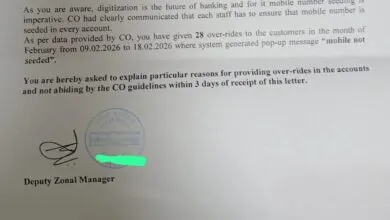RBI imposes Penalties on Indian Bank, Indian Overseas Bank and Mahindra Finance

The Reserve Bank of India (RBI) has imposed fines on two major banks — Indian Bank and Indian Overseas Bank — as well as a finance company, Mahindra & Mahindra Financial Services Ltd. These penalties were issued because they did not follow certain important rules and guidelines set by the RBI.
What Happened with Indian Bank?
Indian Bank has been fined ₹1.60 crore. According to the RBI, the bank failed to properly link the interest rates of some floating rate loans — like retail loans and loans given to Micro, Small, and Medium Enterprises (MSMEs) — to an external benchmark. Under RBI rules, these types of loans must be tied to an external benchmark like the repo rate, but Indian Bank did not fully comply.
Additionally, Indian Bank wrongly collected collateral (security) for small loans under the Kisan Credit Card (KCC) scheme — up to ₹1.6 lakh — and for certain loans to Micro and Small Enterprises up to ₹10 lakh. According to RBI guidelines, banks are not supposed to ask for collateral for such small loans, but Indian Bank did.
The bank also failed to transfer eligible funds to the Depositor Education and Awareness Fund (DEAF) on time. This fund is meant to protect the interests of customers whose deposits have been lying unclaimed for a long time.
Why Was Indian Overseas Bank Fined?
Indian Overseas Bank received a penalty of ₹63.60 lakh. The reason was quite similar to Indian Bank’s issues. The bank had collected collateral for agricultural loans up to ₹1.60 lakh and for certain loans to Micro and Small Enterprises up to ₹10 lakh. As per RBI norms, no collateral should be demanded for loans up to these amounts, but the bank did not follow these rules.
Issues Found at Mahindra & Mahindra Financial Services Ltd.
Mahindra & Mahindra Financial Services Ltd., a non-banking financial company (NBFC), was fined ₹71.30 lakh. The RBI found several problems with their practices:
- Processing Fees and Charges: The company did not clearly disclose processing fees and other charges on some loan application forms, which is required to maintain transparency with borrowers.
- Loan Agreements and Sanction Letters: In some cases, they failed to give copies of loan agreements or share complete loan details with borrowers in the sanction letters.
- Repossession of Vehicles: When borrowers defaulted on loans, Mahindra Finance did not always give a final chance to repay before selling or auctioning off their vehicles. This goes against fair practice norms.
- Customer Identification Issues: Instead of assigning a Unique Customer Identification Code (UCIC) to each borrower, the company assigned multiple codes to some customers. This can cause confusion and complicate tracking borrower history.
RBI’s Message: Follow the Rules
Through these penalties, the RBI is sending a clear message to banks and financial companies that they must strictly follow its rules. These regulations are designed to protect customers, promote fairness, and ensure the financial system remains strong and trustworthy.
